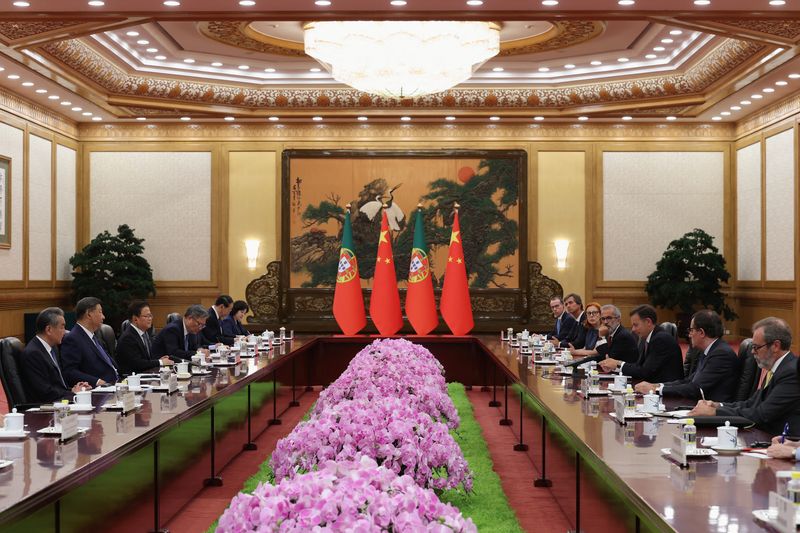By Eduardo Baptista
BEIJING (Reuters) -Portugal’s Prime Minister Luis Montenegro urged Chinese President Xi Jinping to use his country’s close relationship with Russia to push for peace in Ukraine, during a visit to Beijing to seek closer economic ties with China.
Montenegro’s visit to China is the first by a Portuguese head of government in nearly a decade. It comes a week after Xi hosted a massive military parade in Beijing marking 80 years since Japan’s World War Two defeat, flanked by Russia’s Vladimir Putin and North Korea’s Kim Jong Un in what EU foreign policy chief Kaja Kallas has called an “autocratic alliance”.
“We really count on your contribution and the close relationship that China maintains with the Russian Federation in order for us to build, as fast as possible, a just and lasting peace in Ukraine,” the Portuguese leader told his host.
After a crippling recession that pushed Portugal into a bailout in 2011, Chinese cash helped aid its recovery.
Hit hard by the Trump administration’s tariffs that have slashed Portugal’s U.S.-bound exports, Lisbon is now seeking stronger commercial ties with China, even as the European Union accuses the world’s second-largest economy of flooding the region with cheap goods and enabling Russia’s war economy.
Portugal is the only country in western Europe still signed on to Beijing’s flagship overseas infrastructure plan, the Belt and Road Initiative.
Xi said that “China is willing to strengthen strategic communication with Portugal to guarantee bilateral relations (develop) in the correct direction”.
Chinese Premier Li Qiang, in a separate meeting with Montenegro, said China was willing to import more high-quality agricultural and food products from the Iberian nation, according to China’s state broadcaster CCTV.
After the China visit, Montenegro will head to Japan for a state visit, as Lisbon seeks closer ties with Asia’s two largest economies after years of little to no high-level contact.
Chinese foreign direct investment into Portugal reached a cumulative value of over 12 billion euros ($14 billion) by the end of 2024, according to AICEP, making it the country’s fourth-largest source of FDI.
Despite strong investment ties, some tensions remain, including a continued ban on Chinese equipment in Portugal’s 5G network, which the current centre-right government has upheld.
($1 = 0.8498 euros)
(Reporting by Eduardo Baptista; Additional reporting by Yukun Zhang; Writing by Joe Cash; Editing by Himani Sarkar and Ros Russell)

